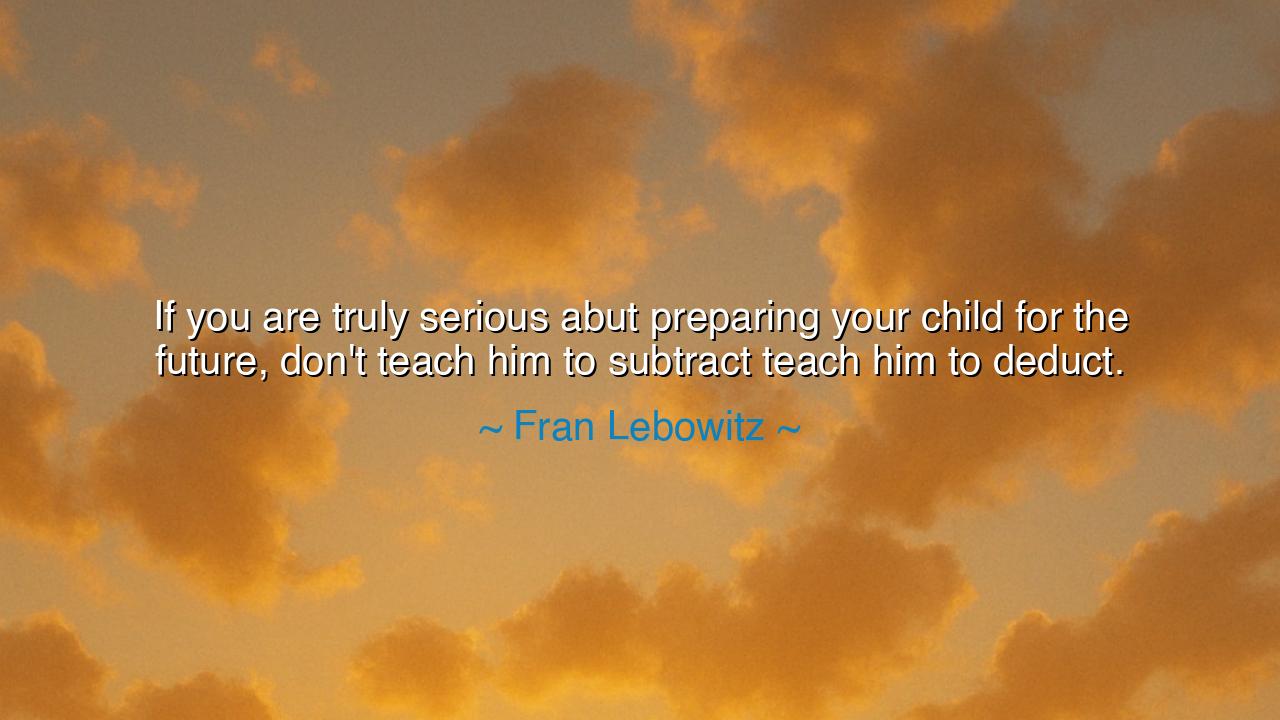
If you are truly serious abut preparing your child for the
If you are truly serious abut preparing your child for the future, don't teach him to subtract teach him to deduct.






"If you are truly serious about preparing your child for the future, don't teach him to subtract, teach him to deduct." With these insightful words, Fran Lebowitz highlights a profound truth about the nature of education and the vital skills that truly prepare a child for the challenges of life. Her message goes beyond the mechanics of learning and speaks to the essence of critical thinking and problem-solving. To “subtract” is to simply remove—an act that is passive and reductive. But to “deduct” is an active process, requiring a deep understanding, reasoning, and the ability to draw conclusions from the world around us. It speaks to the art of inquiry, of looking at life’s complexities and navigating them with intellect and insight.
The ancient philosophers, especially those of Greece, were keenly aware of the power of reasoning and logic in shaping the future. Aristotle taught that the highest form of learning is not simply to acquire facts but to cultivate the ability to think critically and make deductions from those facts. It is through reason that one truly understands the world, for reason allows the mind to connect the dots, to look beyond what is given, and to uncover the deeper truths of existence. Socrates, through his method of questioning, aimed not merely at answering questions, but at fostering the ability to inquire, to deduct meaning from the seemingly mundane and simple truths around him.
In the same way, Lebowitz calls for an education that goes beyond rote memorization and calculation, urging us to teach our children how to reason, how to see connections, and how to think critically about the world. This does not simply prepare them for math exams or academic success, but for the grand challenges of life itself. It is through deduction that great leaders and thinkers, like Leonardo da Vinci or Albert Einstein, were able to see beyond their immediate surroundings and make contributions that shaped the world. They were not content with just subtracting from what they already knew; they deduced new possibilities and altered the course of history.
Consider the example of Isaac Newton, whose work in physics and mathematics revolutionized science. Newton didn’t merely subtract known quantities from unknown ones; he deduced laws of motion and universal gravitation, uncovering patterns that were not immediately apparent. His mind worked not just in numbers, but in a world of possibilities, of connections between forces and movements. This ability to deduct, to understand what was not yet known, became the foundation for countless advancements. Newton’s legacy is a testament to the power of reasoning and critical thought, qualities that Lebowitz champions as essential for preparing children for the future.
In contrast, to focus solely on teaching subtraction—on simply learning what to remove or how to solve a specific equation—can leave one ill-prepared for the complexities of the world. Subtraction, as a metaphor for simply removing obstacles, is a passive approach, limited to small, controlled environments. Deduction, on the other hand, is a process that empowers children to think about causes and effects, to ask why and how, and to create solutions where none seem apparent. It is the act of thinking critically that equips them to face the uncertainties and complexities of the future, a future that will not always provide them with clear answers but will demand that they make sense of the world and its challenges.
The lesson for us, as parents, educators, and mentors, is to guide our children not just toward simple answers but toward the ability to ask the right questions and to deduct meaning from the information they encounter. As we shape the future generation, we must encourage them to see beyond the surface and to engage with the world in a thoughtful, analytical way. The future will not be solved by simple subtraction, by merely taking things away or removing obstacles; it will be solved by those who have the creativity, reason, and courage to deduct and discover new paths forward.
In practical terms, this means providing our children with the tools to think, to explore, and to reason through challenges. Encourage them to question, to synthesize information, and to seek connections between disparate ideas. Let us foster in them the courage to deduce rather than just memorize, to create rather than merely repeat. The world needs thinkers, innovators, and leaders, and those who can deduce the complexities of life, as opposed to simply subtracting from the whole, will be the ones who shape the future. Thus, let us not only teach them the answers, but to seek the questions that will lead them to their own discoveries. In doing so, we equip them to face a world full of opportunities and challenges with clarity and purpose.






AAdministratorAdministrator
Welcome, honored guests. Please leave a comment, we will respond soon